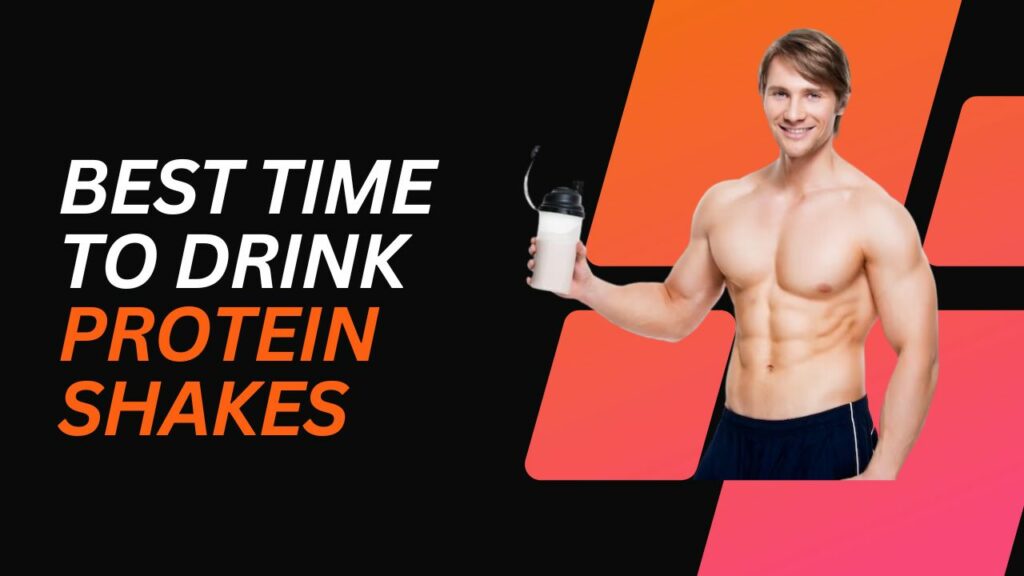Fueling Success:The Perfect Timing for Protein Shake Consumption

Protein shakes have become a staple in the fitness world, offering a convenient and effective way to supplement our protein intake and support our fitness goals. These delicious beverages are packed with essential nutrients, particularly protein, which plays a crucial role in muscle repair, growth, and recovery. However, it’s not just about what’s in the protein shake but also when we consume it that can make a significant difference in achieving our desired outcomes.
Timing is a critical factor when it comes to maximizing the benefits of protein shakes. The human body has specific windows of opportunity where nutrient absorption and utilization are at their peak. By understanding the optimal timing for protein shake consumption, we can enhance muscle building, support workout performance, aid in weight loss efforts, and promote efficient recovery.
In this comprehensive blog, we will delve into the various aspects of protein shake timing. We will explore the best times to drink protein shakes for muscle building and weight loss, whether it’s before or after a workout, in the morning, or at night. We will also address common questions about protein shakes as meal replacements, their role on rest days, and whether it’s beneficial to consume them before bed. By the end of this guide, you’ll have a solid understanding of when and how to incorporate protein shakes into your fitness routine to optimize your results.
Protein Shakes for Muscle Building
Protein plays a fundamental role in muscle growth and repair. When we engage in resistance training or other forms of exercise, our muscles undergo microscopic damage. Protein is essential for repairing and rebuilding these muscle fibers, leading to increased muscle size and strength. Protein shakes provide a convenient and efficient way to supplement our protein intake, ensuring that our muscles have an adequate supply of amino acids, the building blocks of protein, to support optimal growth.
Timing is crucial when it comes to consuming protein shakes for muscle building. The two key periods to focus on are pre-workout and post-workout. Before a workout, consuming a protein shake can help provide the necessary amino acids for muscle protein synthesis during the exercise session. This can help optimize muscle recovery and growth. Post-workout, consuming a protein shake within the first 30 minutes to an hour is recommended to take advantage of the heightened muscle protein synthesis response that occurs immediately after exercise.
When it comes to protein intake for muscle building, individual needs may vary based on factors such as body weight, training intensity, and goals. As a general guideline, it is recommended to consume around 0.7 to 1 gram of protein per pound of body weight per day for muscle building. Protein shakes can contribute to meeting these protein needs, but it’s important to balance them with whole food sources of protein to ensure a well-rounded nutrient intake. The quantity of protein shakes will depend on an individual’s overall protein requirements and preferences. Consulting with a nutritionist or registered dietitian can provide personalized guidance on protein intake and the appropriate quantity of protein shakes for effective muscle building.
By understanding the role of protein in muscle growth, the optimal timing for protein shake consumption, and the appropriate quantity of protein shakes, individuals can effectively support their muscle-building goals and maximize the benefits of their workouts.
Pre-Workout or Post-Workout: When to Drink Protein Shakes
When it comes to consuming protein shakes, timing plays a significant role in optimizing workout performance, muscle recovery, and nutrient absorption. Both pre-workout and post-workout protein shakes offer unique benefits, and the choice between the two depends on individual goals and preferences.
Pre-workout protein shakes can provide a source of readily available amino acids to fuel your muscles during exercise. Consuming protein before a workout can help prevent muscle protein breakdown and promote muscle protein synthesis, leading to improved performance and muscle recovery. Additionally, pre-workout protein shakes can help increase muscle glycogen levels, providing a readily available energy source for intense workouts. Timing-wise, it is recommended to consume a pre-workout protein shake around 30 to 60 minutes before your workout to allow for digestion and nutrient absorption.
On the other hand, post-workout protein shakes are commonly used to kickstart the muscle recovery process. After an intense workout, our muscles are in a heightened state of protein synthesis and nutrient uptake. Consuming a protein shake immediately or within the first 30 minutes to an hour after exercise can help replenish amino acid levels, stimulate muscle protein synthesis, and support muscle repair and growth. This post-workout window is often referred to as the “anabolic window,” where nutrient absorption and utilization are optimized.
The decision to drink a protein shake before or after a workout ultimately depends on individual preferences, goals, and timing constraints. Some individuals may find that consuming a pre-workout protein shake provides them with an energy boost and enhances their performance during the workout. Others may prefer to have a post-workout protein shake to support muscle recovery and replenish nutrients after intense exercise.
If your goal is to maximize muscle growth and recovery, consuming both pre-workout and post-workout protein shakes can be beneficial. However, for individuals with specific goals such as weight loss or endurance training, adjusting the timing and quantity of protein shakes may be necessary. Consulting with a fitness professional or a registered dietitian can provide personalized recommendations based on your unique needs and goals.
Morning or Night: Choosing the Right Time for Protein Shakes
When deciding on the best time to consume protein shakes, it’s essential to consider the specific benefits of having them in the morning or at night. The timing of protein shake consumption can influence energy levels, metabolism, muscle preservation, muscle repair, and recovery.
Morning protein shakes offer several benefits to kickstart your day. Consuming a protein shake in the morning can provide a quick and convenient source of nutrients to fuel your body and jumpstart your metabolism. By starting your day with a protein-rich meal or shake, you can enhance feelings of satiety, which may aid in weight management and reduce cravings throughout the day. Moreover, morning protein shakes can help preserve muscle mass and prevent muscle breakdown by providing the necessary amino acids for muscle repair and growth.
In addition to the metabolic advantages, morning protein shakes can provide an energy boost for your workouts. If you prefer exercising in the morning, having a protein shake beforehand can provide the necessary fuel to enhance performance and support muscle recovery. It is important to note that consuming a balanced meal or snack containing carbohydrates and protein alongside your morning protein shake can further optimize energy levels and workout performance.
On the other hand, nighttime protein shakes offer unique benefits for muscle repair, recovery, and overnight muscle protein synthesis. During sleep, our bodies undergo crucial processes for muscle repair and growth. Consuming a protein shake before bed can provide the necessary amino acids to support these processes. The slow and sustained release of amino acids from the protein shake can help stimulate muscle protein synthesis throughout the night, leading to enhanced muscle recovery and growth.
Protein Shakes as Meal Replacements
Protein shakes have gained popularity as a convenient and potentially effective option for meal replacement, particularly for those aiming for weight management. Using protein shakes as meal replacements involves replacing one or more meals with a protein shake to create a calorie deficit or ensure adequate protein intake. This approach offers several benefits, including portion control, convenience, and the ability to customize nutrient content.
When considering protein shakes as meal replacements, it’s important to recognize both their benefits and limitations. Protein shakes can provide a quick and convenient source of high-quality protein, which is essential for muscle maintenance, repair, and satiety. They are often fortified with vitamins and minerals, offering a well-rounded nutritional profile. Additionally, protein shakes are generally lower in calories compared to typical meals, which can aid in creating a calorie deficit for weight loss.
However, it’s crucial to acknowledge that protein shakes alone may not provide all the nutrients required for a balanced diet. While they offer protein, they may lack the variety of macronutrients and micronutrients found in whole foods. Whole foods provide a wide range of vitamins, minerals, fiber, and phytochemicals that support overall health and well-being. Therefore, it is advisable to use protein shakes as a supplement to a well-balanced diet rather than a complete replacement for whole foods.
- Determine your calorie and protein requirements: Consult with a healthcare professional or a registered dietitian to establish your individual calorie and protein goals based on factors such as age, sex, weight, activity level, and overall health.
- Choose high-quality protein shakes: Opt for protein shakes that contain a complete amino acid profile and are low in added sugars and artificial ingredients. Look for brands that have undergone third-party testing for quality and safety.
- Customize your protein shake: Enhance the nutrient content of your protein shake by adding additional ingredients such as fruits, vegetables, healthy fats (e.g., nut butter or avocado), and fiber-rich sources (e.g., chia seeds or flaxseeds).
- Balance your meals: If using protein shakes as meal replacements, ensure that your other meals include a variety of whole foods, including lean proteins, complex carbohydrates, healthy fats, and plenty of fruits and vegetables. This helps to provide a broad spectrum of nutrients and promote overall health.
- Monitor your overall calorie intake: Be mindful of your total daily calorie intake to ensure it aligns with your weight management goals. While protein shakes can aid in reducing calories, it’s important to maintain a balanced overall energy intake to meet your nutritional needs.
Remember that meal replacement with protein shakes should be done under the guidance of a healthcare professional or a registered dietitian, especially if you have specific dietary requirements or medical conditions.
Cardio Workouts: Timing Protein Shakes for Optimal Performance
Protein shakes play a crucial role in supporting cardio workouts and endurance exercises by providing the necessary fuel and aiding in muscle recovery. Engaging in cardio exercises such as running, cycling, or swimming places increased demands on the muscles and depletes glycogen stores. Protein shakes can help replenish these stores, enhance muscle repair, and support overall performance during cardio workouts.
Consuming protein shakes before or after cardio workouts can offer specific benefits for muscle recovery and energy replenishment. Consuming a protein shake before a cardio session can help provide a readily available source of amino acids during the exercise, thereby reducing muscle breakdown and promoting muscle repair. Additionally, it can assist in preserving muscle glycogen stores, which can improve endurance and delay the onset of fatigue.
On the other hand, consuming a protein shake after a cardio workout is equally important for optimal muscle recovery. Post-workout protein intake stimulates muscle protein synthesis and helps repair and rebuild the muscles damaged during the exercise. It also assists in replenishing glycogen stores, promoting efficient recovery, and preparing the body for subsequent workouts.
- Short-duration, moderate-intensity cardio: If your cardio workout lasts less than 45 minutes and is of moderate intensity, you may not require immediate protein shake consumption. Focus on maintaining a well-balanced diet that includes protein-rich foods within a few hours of the workout.
- Prolonged or high-intensity cardio: For longer-duration or high-intensity cardio sessions exceeding 45 minutes, consuming a protein shake before or during the workout can be beneficial. Aim to have the protein shake approximately 30 minutes to an hour before the exercise to allow for digestion and absorption.
- Post-workout protein shake: Regardless of the duration and intensity of the cardio workout, it is essential to consume a protein shake within 30 minutes to an hour after the session. This timing allows for optimal muscle recovery and glycogen replenishment.
Keep in mind that individual preferences and digestive comfort may influence the timing of protein shake consumption. Experiment with different timings to find what works best for you and supports your performance and recovery goals.
Final Thought.
Determining the best time to drink protein shakes is a highly individualized decision that depends on various factors, including personal preferences, fitness goals, and lifestyle constraints. While there are general guidelines and recommendations, it’s essential to listen to your body and experiment with different timing strategies to find what works best for you.
As you embark on your fitness journey, don’t be afraid to try different protein shake timing options and observe how your body responds. Pay attention to your energy levels, workout performance, muscle recovery, and overall well-being. Some individuals may find that consuming protein shakes before or after a workout works best for them, while others may benefit from different timings, such as morning or nighttime.
Keep in mind that your body’s response to protein shake timing may also evolve over time. Factors such as changes in your workout routine, fitness goals, and lifestyle can influence your preferences and needs. Stay open to adjusting and adapting your protein shake timing as necessary.
Thank you for joining us on this fitness journey! We hope you found our Protein Shake Timing: When to Drink Protein Shakes for Maximum Results? blog insightful and inspiring. Our aim is to provide you with valuable information, expert advice, and motivational content to support you in your wellness endeavors.
Related Post :-
- How To Do Wall Pushups
- Hand Size Demystified
- CrossFit Unleashed
- Barbell Lunges
- Forearm Fortitude
- Kettlebell Circuit
- Power of Personal Trainers
- Down Pull-Ups
FAQs
Should you drink protein shakes before or after a workout?
For optimal muscle recovery and growth, it's generally recommended to consume a protein shake after your workout. This helps replenish protein stores and provides the necessary amino acids to support muscle repair. However, some individuals may also benefit from consuming a protein shake before their workout, especially if they have longer training sessions or prefer to train in a fasted state. Experiment with both options and observe how your body responds to find what works best for you.
Is it better to drink protein shakes in the morning or at night?
The timing of protein shake consumption can vary depending on your goals and preferences. Drinking a protein shake in the morning can help kickstart your day by providing a readily available source of protein and supporting muscle preservation. On the other hand, consuming a protein shake at night can aid in muscle recovery and repair during sleep. Ultimately, it's about finding a time that aligns with your routine and supports your individual goals.
How long after a workout should you drink a protein shake?
It's generally recommended to consume a protein shake within 30 minutes to an hour after your workout. This timeframe is known as the post-workout window, during which your muscles are primed to absorb nutrients for optimal recovery. However, it's important to note that the overall daily protein intake and consistency in meeting your protein needs throughout the day are more important than focusing solely on the timing of a single protein shake.
Can you drink protein shakes as a meal replacement?
Protein shakes can be a convenient option as a meal replacement, especially if you're in a rush or have difficulty consuming solid food. However, it's important to ensure that your meal replacement shake provides a balanced nutritional profile, including carbohydrates, fats, and other essential nutrients. While protein shakes can contribute to weight loss or maintenance, they shouldn't replace whole-food meals on a regular basis. It's best to incorporate a variety of whole, nutrient-dense foods into your diet.
When should you drink protein shakes for weight loss?
Protein shakes can be a valuable addition to a weight loss plan when consumed strategically. They can help increase satiety, preserve lean muscle mass, and support your overall calorie deficit. Consuming a protein shake as a meal replacement or as a snack between meals can help control hunger and manage calorie intake. It's important to consider protein shakes as part of a well-rounded weight loss program that includes a balanced diet and regular exercise.
Should you drink protein shakes on rest days?
While protein needs may be slightly lower on rest days compared to training days, it's still important to consume adequate protein for muscle recovery and repair. Drinking a protein shake on rest days can help ensure you meet your protein requirements and support overall muscle health. Adjusting the serving size or incorporating other protein-rich foods into your meals can be a suitable option for rest days.

Meet Pradeep Singh, your go-to guide for all things fitness, health, and motivation. With over 7 years in the field, Pradeep brings a blend of expertise and real-world experience to his writing. From workout tips to healthy living insights, he simplifies complex topics, making fitness accessible for everyone. His authentic approach and genuine passion aim to inspire and support your wellness journey. Get ready to embark on a path to a healthier lifestyle with Pradeep as your trusted companion and motivator.





















